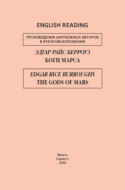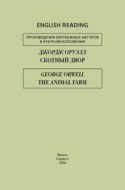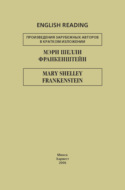Kitabı oku: «Собака Баскервилей / The Hound of the Baskervilles»
Составление, комментарии: Андрей Крюк
© Подготовка. Харвест, 2006
Chapter 1
Mr. Sherlock Holmes
Mr. Sherlock Holmes, who was usually very late in the mornings, save upon those not infrequent occasions when he was up all night, was seated at the breakfast table. I stood upon the hearth-rug1 and picked up the stick which our visitor had left behind him the night before. It was a fine, thick piece of wood. Just under the head was a broad silver band nearly an inch across. “To James Mortimer, M.R.C.S., from his friends of the C.C.H.,” was engraved upon it, with the date “1884.” It was just such a stick as the old-fashioned family practitioner used to carry— dignified, solid, and reassuring.
“Well, Watson, what do you make of it?”
Holmes was sitting with his back to me, and I had given him no sign of my occupation.
“How did you know what I was doing? I believe you have eyes in the back of your head.”
“I have, at least, a well-polished, silver-plated2 coffee-pot in front of me,” said he. “But, tell me, Watson, what do you make of our visitor’s stick? Since we have been so unfortunate as to miss him, this accidental souvenir becomes of importance. Let me hear you reconstruct the man by an examination of it.”
“I think,” said I, following as far as I could the methods of my companion, “that Dr. Mortimer is a successful, elderly medical man, well-esteemed since those who know him give him this mark of their appreciation.”
“Good!” said Holmes. “Excellent!”
“I think also that the probability is in favour of his being a country practitioner who does a great deal of his visiting on foot.”
“Why so?”
“Because this stick, though originally a very handsome one has been so knocked about that I can hardly imagine a town practitioner carrying it. The thick-iron ferrule3 is worn down, so it is evident that he has done a great amount of walking with it.”
“Perfectly sound!” said Holmes.
“And then again, there is the ‘friends of the C.C.H.’ I should guess that to be the Something Hunt, the local hunt4 to whose members he has possibly given some surgical assistance, and which has made him a small presentation in return.”
“Really, Watson, you excel5 yourself,” said Holmes, pushing back his chair and lighting a cigarette.
I must admit that his words gave me keen pleasure. He now took the stick from my hands and examined it for a few minutes with his naked eyes. Then with an expression of interest he laid down his cigarette, and carrying the cane to the window, he looked over it again with a convex lens6.
“Interesting, though elementary,” said he as he returned to his favourite corner of the settee. “There are certainly one or two indications upon the stick. It gives us the basis for several deductions.”
“Has anything escaped me?” I asked with some self-importance. “I trust that there is nothing of consequence which I have overlooked?”
“I am afraid, my dear Watson, that most of your conclusions were erroneous. Not that you are entirely wrong in this instance. The man is certainly a country practitioner. And he walks a good deal.”
“Then I was right.”
“To that extent.”
“But that was all.”
“No, no, my dear Watson, not all—by no means all. I would suggest, for example, that a presentation to a doctor is more likely to come from a hospital than from a hunt, and that when the initials ‘C.C.’ are placed before that hospital the words ‘Charing Cross’ very naturally suggest themselves.”
“You may be right.”
“The probability lies in that direction. And if we take this as a working hypothesis we have a fresh basis from which to start our construction of this unknown visitor.”
“Well, then, supposing that ‘C.C.H.’ does stand for ‘Charing Cross Hospital,’ what further inferences may we draw?”
“Do none suggest themselves? You know my methods. Apply them!”
“I can only think of the obvious conclusion that the man has practised in town before going to the country.”
“I think that we might venture a little farther than this. Look at it in this light. On what occasion would it be most probable that such a presentation would be made? When would his friends unite to give him a pledge of their good will? Obviously at the moment when Dr. Mortimer withdrew from the service of the hospital in order to start a practice for himself.”
“It certainly seems probable.”
“Now, you will observe that he could not have been on the staff of the hospital, since only a man well-established in a London practice could hold such a position, and such a one would not drift into the country. What was he, then? If he was in the hospital and yet not on the staff he could only have been a house-surgeon or a house-physician— little more than a senior student. And he left five years ago—the date is on the stick. So your grave, middle-aged family practitioner vanishes into thin air, my dear Watson, and there emerges a young fellow under thirty, amiable, unambitious, absent-minded, and the possessor of a favourite dog, which I should describe roughly as being larger than a terrier and smaller than a mastiff.”
I laughed incredulously as Sherlock Holmes leaned back in his settee and blew little wavering rings of smoke up to the ceiling.
“As to the latter part, I have no means of checking you,” said I, “but at least it is not difficult to find out a few particulars about the man’s age and professional career.” From my small medical shelf I took down the Medical Directory and turned up the name. There were several Mortimers, but only one who could be our visitor. I read his record aloud.
“Mortimer, James, M.R.C.S., 1882, Grimpen, Dartmoor, Devon. House-surgeon, from 1882 to 1884, at Charing Cross Hospital. Winner of the Jackson prize for Comparative Pathology, with essay entitled ‘Is Disease a Reversion?’ Corresponding member of the Swedish Pathological Society. Author of ‘Some Freaks of Atavism’ (Lancet 1882). ‘Do We Progress?’ (Journal of Psychology, March, 1883). Medical Officer for the parishes of Grimpen, Thorsley, and High Barrow.”
“No mention of that local hunt, Watson,” said Holmes with a mischievous7 smile, “but a country doctor, as you very astutely8 observed. I think that I am fairly justified in my inferences9. As to the adjectives, I said, if I remember right, amiable, unambitious, and absent-minded. It is my experience that it is only an amiable man in this world who receives testimonials10, only an unambitious one who abandons a London career for the country, and only an absent-minded one who leaves his stick and not his visiting-card after waiting an hour in your room.”
“And the dog?”
“Has been in the habit of carrying this stick behind his master. Being a heavy stick the dog has held it tightly by the middle, and the marks of his teeth are very plainly visible. The dog’s jaw, as shown in the space between these marks, is too broad in my opinion for a terrier and not broad enough for a mastiff. It may have been—yes, by Jove, it is a curly-haired spaniel.”
He had risen and paced the room as he spoke. Now he halted in the recess of the window11. There was such a ring of conviction in his voice that I glanced up in surprise.
“My dear fellow, how can you possibly be so sure of that?”
“For the very simple reason that I see the dog himself on our very door-step, and there is the ring of its owner. Don’t move, I beg you, Watson. He is a professional brother of yours, and your presence may be of assistance to me. Come in!”
The appearance of our visitor was a surprise to me, since I had expected a typical country practitioner. He was a very tall, thin man, with a long nose like a beak, which jutted out between two keen, gray eyes, set closely together and sparkling brightly from behind a pair of gold-rimmed glasses. He was clad12 in a professional but rather slovenly13fashion, for his frock-coat was dingy and his trousers frayed14. Though young, his long back was already bowed, and he walked with a forward thrust of his head and a general air of peering benevolence15. As he entered his eyes fell upon the stick in Holmes’s hand, and he ran towards it with an exclamation of joy. “I am so very glad,” said he. “I was not sure whether I had left it here or in the Shipping Office. I would not lose that stick for the world.”
“A presentation, I see,” said Holmes.
“Yes, sir.”
“From Charing Cross Hospital?”
“From one or two friends there on the occasion of my marriage.”
“Dear, dear, that’s bad!” said Holmes, shaking his head.
Dr. Mortimer blinked through his glasses in mild astonishment. “Why was it bad?”
“Only that you have disarranged our little deductions. Your marriage, you say?”
“Yes, sir. I married, and so left the hospital, and with it all hopes of a consulting practice. It was necessary to make a home of my own.”
“Come, come, we are not so far wrong, after all,” said Holmes. “And now, Dr. James Mortimer—”
“Mister, sir, Mister—a humble M.R.C.S16.”
“And a man of precise mind, evidently.”
“A dabbler17 in science, Mr. Holmes, a picker up of shells on the shores of the great unknown ocean. I presume that it is Mr. Sherlock Holmes whom I am addressing and not—”
“No, this is my friend Dr. Watson.”
“Glad to meet you, sir. I have heard your name mentioned in connection with that of your friend. You interest me very much, Mr. Holmes. I had hardly expected so dolichocephalic18 a skull or such well-marked supraorbital19 development. Would you have any objection to my running my finger along your parietal fissure20? A cast of your skull, sir, until the original is available, would be an ornament to any anthropological museum.”
Sherlock Holmes waved our strange visitor into a chair. “You are an enthusiast in your line of thought, I perceive, sir, as I am in mine,” said he. “I observe from your forefinger that you make your own cigarettes. Have no hesitation in lighting one.”
The man drew out paper and tobacco and twirled the one up in the other with surprising dexterity. He had long, quivering21 fingers as agile22 and restless as the antennae of an insect.
Holmes was silent, but his little darting glances showed me the interest which he took in our curious companion. “I presume, sir,” said he at last, “that it was not merely for the purpose of examining my skull that you have done me the honour to call here last night and again today?”
“No, sir, no; though I am happy to have had the opportunity of doing that as well. I came to you, Mr. Holmes, because I recognized that I am myself an unpractical man and because I am suddenly confronted with a most serious and extraordinary problem.”
“I think, Dr. Mortimer, you would do wisely if you would kindly tell me plainly what the exact nature of the problem is in which you demand my assistance.”
Chapter 2
The Curse of the Baskervilles
“I have in my pocket a manuscript,” said Dr. James Mortimer.
“I observed it as you entered the room,” said Holmes.
“It is an old manuscript.”
“Early eighteenth century, unless it is a forgery.”
“How can you say that, sir?”
“You have presented an inch or two of it to my examination all the time that you have been talking. It would be a poor expert who could not give the date of a document within a decade or so. You may possibly have read my little monograph upon the subject. I put that at 1730.”
“The exact date is 1742.” Dr. Mortimer drew it from his breast-pocket. “This family paper was committed to my care by Sir Charles Baskerville, whose sudden and tragic death some three months ago created so much excitement in Devonshire. I may say that I was his personal friend as well as his medical attendant. He was a strong-minded man, sir, shrewd, practical, and as unimaginative as I am myself. Yet he took this document very seriously, and his mind was prepared for just such an end as did eventually overtake him.”
Holmes stretched out his hand for the manuscript and flattened it upon his knee. “You will observe, Watson, the alternative use of the long s and the short. It is one of several indications which enabled me to fix the date.”
I looked over his shoulder at the yellow paper and the faded script. At the head was written: “Baskerville Hall,” and below in large, scrawling figures: “1742.”
“It appears to be a statement of some sort.”
“Yes, it is a statement of a certain legend which runs in the Baskerville family.”
“But I understand that it is something more modern and practical upon which you wish to consult me?”
“Most modern. A most practical, pressing matter, which must be decided within twenty-four hours. But the manuscript is short and is intimately connected with the affair. With your permission I will read it to you.”
Holmes leaned back in his chair, placed his finger-tips together, and closed his eyes, with an air of resignation23. Dr. Mortimer turned the manuscript to the light and read in a high, cracking voice the following curious, old-world narrative:
“Of the origin of the Hound of the Baskervilles there have been many statements, yet as I come in a direct line from Hugo Baskerville, and as I had the story from my father, who also had it from his, I have set it down with all belief that it occurred even as is here set forth24.
“Know then that in the time of the Great Rebellion this Manor25 of Baskerville was held by Hugo of that name26, nor can it be gainsaid27 that he was a most wild, profane, and godless man. This, in truth, his neighbours might have pardoned, seeing that saints have never flourished in those parts, but there was in him a certain wanton28 and cruel humour. It chanced that this Hugo came to love (if, indeed, so dark a passion may be known under so bright a name) the daughter of a yeoman who held lands near the Baskerville estate. But the young maiden, being discreet and of good repute, would ever avoid him, for she feared his evil name. So it came to pass that one Michaelmas29 this Hugo, with five or six of his idle and wicked companions, stole down upon the farm and carried off the maiden. When they had brought her to the Hall the maiden was placed in an upper chamber, while Hugo and his friends sat down to a long carouse30, as was their nightly custom. Now, the poor lass upstairs was like to have her wits turned at the singing and shouting and terrible oaths which came up to her from below. At last in the stress of her fear she did that which might have daunted the bravest or most active man, for by the aid of the growth of ivy which covered (and still covers) the south wall she came down from under the eaves31, and ran homeward across the moor32.
“It chanced that some little time later Hugo left his guests to carry food and drink—with other worse things, perhaps—to his captive, and so found the cage empty and the bird escaped. Then, as it would seem, he became as one that has a devil, for, rushing down the stairs into the dining-hall, he cried aloud before all the company that he would that very night render his body and soul to the Powers of Evil if he might but overtake the wench33. And while the revellers34 stood aghast35 at the fury of the man, one more wicked or, it may be, more drunken than the rest, cried out that they should put the hounds upon her. Hugo ran from the house, crying to his grooms that they should saddle his mare and unkennel the pack36, and giving the hounds a kerchief of the maid’s, he swung them to the line, and so off full cry in the moonlight over the moor.
Everything was now in an uproar, some calling for their pistols, some for their horses, and some for another flask of wine. And the whole of them, thirteen in number, took horse and started in pursuit. The moon shone clear above them, and they rode swiftly, taking that course which the maid must needs have taken if she were to reach her own home.
“They had gone a mile or two when they passed one of the night shepherds upon the moorlands, and they cried to him to know if he had seen the hunt. And the man, as the story goes, was so crazed with fear that he could hardly speak, but at last he said that he had indeed seen the unhappy maiden, with the hounds upon her track. ‘But I have seen more than that,’ said he, ‘for Hugo Baskerville passed me upon his black mare, and there ran mute behind him such a hound of hell as God forbid should ever be at my heels.’ So the drunken squires cursed the shepherd and rode onward. But soon their skins turned cold, for there came a galloping across the moor, and the black mare went past with trailing bridle37 and empty saddle. Then the revellers rode close together, for a great fear was on them. Riding slowly they came at last upon the hounds. These, though known for their courage and their breed, were whimpering in a cluster at the head of a deep dip or goyal, as we call it, upon the moor, some slinking away and some, with starting hackles38 and staring eyes, gazing down the narrow valley before them.
“The company had come to a halt, more sober men, as you may guess, than when they started. The most of them would by no means advance, but three of them, the boldest, or it may be the most drunken, rode forward down the goyal. Now, it opened into a broad space in which stood two of those great stones, still to be seen there, which were set by certain forgotten peoples in the days of old. The moon was shining bright upon the clearing, and there in the centre lay the unhappy maid where she had fallen, dead of fear and of fatigue. But it was not the sight of her body, nor yet was it that of the body of Hugo Baskerville lying near her, which raised the hair upon the heads of these three dare-devil roysterers39, but it was that, standing over Hugo, and plucking at his throat, there stood a foul thing, a great, black beast, shaped like a hound, yet larger than any hound that ever mortal eye has rested upon. And even as they looked the thing tore the throat out of Hugo Baskerville, on which, as it turned its blazing eyes and dripping jaws upon them, the three shrieked with fear and rode for dear life, still screaming, across the moor. One, it is said, died that very night of what he had seen, and the other twain were but broken men for the rest of their days.
“Such is the tale, my sons, of the coming of the hound which is said to have plagued the family so sorely ever since. Many of the family have been unhappy in their deaths, which have been sudden, bloody, and mysterious. Yet may we shelter ourselves in the infinite goodness of Providence40, which would not forever punish the innocent beyond that third or fourth generation which is threatened in Holy Writ41. To that Providence, my sons, I hereby advice you to refrain from crossing the moor in those dark hours when the powers of evil are exalted.
“[This from Hugo Baskerville to his sons Rodger and John, with instructions that they say nothing thereof42 to their sister Elizabeth.]”
When Dr. Mortimer had finished reading this singular narrative he pushed his spectacles up on his forehead and stared across at Mr. Sherlock Holmes. The latter yawned and tossed the end of his cigarette into the fire.
“Well?” said he.
“Do you not find it interesting?”
“To a collector of fairy tales.”
Dr. Mortimer drew a folded newspaper out of his pocket.
“Now, Mr. Holmes, we will give you something a little more recent. This is the Devon County Chronicle of May 14th of this year. It is a short account of the facts determined at the death of Sir Charles Baskerville which occurred a few days before that date.”
My friend leaned a little forward and his expression became intent. Our visitor readjusted his glasses and began:
“The recent sudden death of Sir Charles Baskerville, whose name has been mentioned as the probable Liberal candidate for Mid-Devon at the next election, has cast a gloom over the county. Though Sir Charles had resided at Baskerville Hall for a comparatively short period his amiability of character and extreme generosity had won the affection and respect of all who had been brought into contact with him. In these days of nouveaux riches it is refreshing to find a case where the descendant of an old county family which has fallen upon evil days is able to make his own fortune and to bring it back with him to restore the fallen grandeur of his line. Sir Charles, as is well known, made large sums of money in South African speculation. More wise than those who go on until the wheel turns against them, he realized his gains and returned to England with them. It is only two years since he took up his residence at Baskerville Hall, and it is common talk how large were those schemes of reconstruction and improvement which have been interrupted by his death. Being himself childless, it was his openly expressed desire that the whole countryside should, within his own lifetime, profit by his good fortune, and many will have personal reasons for bewailing43 his untimely end. His generous donations to local and county charities have been frequently chronicled in these columns.
“The circumstances connected with the death of Sir Charles cannot be said to have been entirely cleared up by the investigation, but at least enough has been done to dispose of those rumours to which local superstition44 has given rise. There is no reason whatever to suspect foul play, or to imagine that death could be from any but natural causes. Sir Charles was a widower, and a man who may be said to have been in some ways of an eccentric habit of mind. In spite of his considerable wealth he was simple in his personal tastes, and his indoor servants at Baskerville Hall consisted of a married couple named Barrymore, the husband acting as butler and the wife as housekeeper. Their evidence, confirmed by that of several friends, tends to show that Sir Charles’s health has for some time been impaired, and points especially to some affection45 of the heart, manifesting itself in changes of colour, breathlessness, and acute attacks of nervous depression. Dr. James Mortimer, the friend and medical attendant of the deceased, has given evidence to the same effect.
“The facts of the case are simple. Sir Charles Baskerville was in the habit every night before going to bed of walking down the famous yew46 alley of Baskerville Hall. The evidence of the Barrymores shows that this had been his custom. On the fourth of May Sir Charles had declared his intention of starting next day for London, and had ordered Barrymore to prepare his luggage. That night he went out as usual for his nocturnal walk, in the course of which he was in the habit of smoking a cigar. He never returned. At twelve o’clock Barrymore, finding the hall door still open, became alarmed, and, lighting a lantern, went in search of his master. The day had been wet, and Sir Charles’s footmarks were easily traced down the alley. Halfway down this walk there is a gate which leads out on to the moor. There were indications that Sir Charles had stood for some little time here. He then proceeded down the alley, and it was at the far end of it that his body was discovered. One fact which has not been explained is the statement of Barrymore that his master’s footprints altered their character from the time that he passed the moor-gate, and that he appeared from thence onward47 to have been walking upon his toes. One Murphy, a gipsy horse-dealer, was on the moor at no great distance at the time, but he appears by his own confession to have been very drunk. He declares that he heard cries but is unable to state from what direction they came. No signs of violence were to be discovered upon Sir Charles’s person, and though the doctor’s evidence pointed to an almost incredible facial distortion—so great that Dr. Mortimer refused at first to believe that it was indeed his friend and patient who lay before him—it was explained that that is a symptom which is not unusual in cases of dyspnoea48 and death from cardiac exhaustion. This explanation was borne out by the postmortem examination, which showed long-standing organic disease, and the coroner’s jury49 returned a verdict in accordance with the medical evidence. It is well that this is so, for it is obviously of the utmost importance that Sir Charles’s heir50 should settle at the Hall and continue the good work which has been so sadly interrupted. Had the prosaic finding of the coroner not finally put an end to the romantic stories which have been whispered in connection with the affair, it might have been difficult to find a tenant for Baskerville Hall. It is understood that the next of kin is Mr. Henry Baskerville, if he be still alive, the son of Sir Charles Baskerville’s younger brother. The young man when last heard of was in America, and inquiries are being made with a view to informing him of his good fortune.”
Dr. Mortimer refolded his paper and replaced it in his pocket. “Those are the public facts, Mr. Holmes, in connection with the death of Sir Charles Baskerville.”
“I must thank you,” said Sherlock Holmes, “for calling my attention to a case which certainly presents some features of interest. I had observed some newspaper comment at the time, but I was exceedingly preoccupied by that little affair of the Vatican cameos, and in my anxiety to oblige the Pope I lost touch with several interesting English cases. This article, you say, contains all the public facts?”
“It does.”
“Then let me have the private ones.” He leaned back, put his finger-tips together, and assumed his most emotionless and judicial expression.
“With you there is no reason why I should not be perfectly frank.
“The moor is very sparsely inhabited, and those who live near each other are thrown very much together. For this reason I saw a good deal of Sir Charles Baskerville. With the exception of Mr. Frankland, of Lafter Hall, and Mr. Stapleton, the naturalist, there are no other men of education within many miles. Sir Charles was a retiring man, but the chance of his illness brought us together, and a community of interests in science kept us so. He had brought back much scientific information from South Africa, and many a charming evening we have spent together discussing the comparative anatomy of the Bushman and the Hottentot.
“Within the last few months it became increasingly plain to me that Sir Charles’s nervous system was strained to the breaking point. He had taken this legend which I have read you exceedingly to heart—so much so that, although he would walk in his own grounds, nothing would persuade him to go out upon the moor at night. Incredible as it may appear to you, Mr. Holmes, he was honestly convinced that a dreadful fate overhung his family, and certainly the records which he was able to give of his ancestors were not encouraging. The idea of some ghostly presence constantly haunted him, and on more than one occasion he has asked me whether I had on my medical journeys at night ever seen any strange creature or heard the barking of a hound. The latter question he put to me several times, and always with a voice which vibrated with excitement.
“I can well remember driving up to his house in the evening some three weeks before the fatal event. He chanced to be at his hall door. I had descended from my gig51 and was standing in front of him, when I saw his eyes fix themselves over my shoulder and stare past me with an expression of the most dreadful horror. I turned round and had just time to catch a glimpse of something which I took to be a large black calf passing at the head of the drive. So excited and alarmed was he that I was compelled to go down to the spot where the animal had been and look around for it. It was gone, however, and the incident appeared to make the worst impression upon his mind. I stayed with him all the evening, and it was on that occasion, to explain the emotion which he had shown, that he confided to my keeping that narrative which I read to you when first I came. I mention this small episode because it assumes some importance in view of the tragedy which followed, but I was convinced at the time that the matter was entirely trivial and that his excitement had no justification.
“It was at my advice that Sir Charles was about to go to London. His heart was, I knew, affected, and the constant anxiety in which he lived, however chimerical the cause of it might be, was evidently having a serious effect upon his health. I thought that a few months among the distractions of town would send him back a new man. Mr. Stapleton, a mutual friend who was much concerned at his state of health, was of the same opinion. At the last instant came this terrible catastrophe.
“On the night of Sir Charles’s death Barrymore the butler, who made the discovery, sent Perkins the groom on horseback to me, and as I was sitting up late I was able to reach Baskerville Hall within an hour of the event. I checked and confirmed all the facts which were mentioned at the inquest. I followed the footsteps down the yew alley, I saw the spot at the moor-gate where he seemed to have waited, I remarked the change in the shape of the prints after that point, I noted that there were no other footsteps save those of Barrymore on the soft gravel, and finally I carefully examined the body, which had not been touched until my arrival. Sir Charles lay on his face, his arms out, his fingers dug into the ground, and his features convulsed with some strong emotion to such an extent that I could hardly have sworn to his identity. There was certainly no physical injury of any kind. But one false statement was made by Barrymore at the inquest. He said that there were no traces upon the ground round the body. He did not observe any. But I did—some little distance off, but fresh and clear.”
“Footprints?”
“Footprints.”
“A man’s or a woman’s?”
Dr. Mortimer looked strangely at us for an instant, and his voice sank almost to a whisper as he answered.
“Mr. Holmes, they were the footprints of a gigantic hound!”






